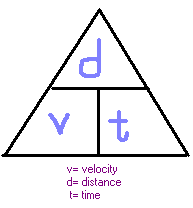How do we measure inertia?
Mass
Your car drives for 4 hours at an average speed of 60 mi/hr. How far did you drive?
240 miles
State Newton's 3rd law
For every force, there is an equal and opposite force
State newton's second law
F=ma
Acceleration is directly proportional to the force and inversely proportional to the mass
What did Aristotle believe about the telos of all things?
He believed their goal or end was to be at rest, so everything comes to rest because of their telos (goal or end)
How is velocity different from speed?
Velocity describes both direction and speed while speed just measures how fast something moves (how much distance is covered per unit of time)
Imagine you are in a rollerskating rink wearing roller skates. What happens if you push against the wall of the rink with your hands? Why?
You would slide in the opposite direction you pushed, towards the center of the rink because the wall exerts the force equal to your push on you.
What is the mass of an object that takes 300 N of net force to accelerate at 5 m/s2?
m=F/a=300/5=60 kg
Why do things naturally come to rest in our everyday experience?
Friction and air resistance put forces on them until they stop moving
Draw the velocity, distance, and time triangle. Give the formula for velocity given distance and time

v=d/t
Rifles jerk into your shoulder when you fire them. Where does this force come from?
The bullet is pushed forward by the explosion inside the gun but it pushes back on the air inside the rifle with an equal and opposite force. The air then hits the back of the rifle, causing it to jerk into your shoulder
What would happen to a pickup truck's acceleration if more and more monkeys kept jumping into its bed and staying there? (No more monkeys jumping in the bed!)
The acceleration would decrease...unless the jumping monkeys terrified you so much that you pushed down on the gas... in which case it could increase...if the increased force of more gas exploding could compensate for the increased mass of the monkeys (I've always wanted an excuse to work that phrase into a conversation)
A rocket traveling at 1/2 the speed of light in deep space to a planet 1 light year away, suddenly runs out of fuel. Are the people on board doomed? Why or why not?
The people will reach the planet in 2 years, so if they had enough food they should be fine. They keep traveling at 1/2 the speed of light, even without engines, because in the absence of force, objects won't accelerate (change their velocity).
A car drives 300 miles in 150 minutes. How fast did it drive in km/hr
300 miles * (1.6 km/1 mi) = 480 km
150 minutes * (1 hr/60 min) = 2.5 hr
v=d/t =480 km/2.5 hr = 192 km/hr
What would happen if you stand up and push on the wall of the classroom right now, would you move? Why?
No, the wall pushes back on you, but that force is not enough to overcome the frictional force of your shoes with the ground.
An object weighing 4000 grams is gaining 5 mi/hr of speed every second. How much net force is the object experiencing? Do unit conversions, remember there are 1609 m in 1 mi and 3600 seconds in 1 hr.
Unit conversions first!
4000 g * (1 kg/1000 g) = 4 kg
5 mi/hr * (1609 m/1 mi) * (1 hr/3600 s)=2.23 m/s
so the acceleration is 2.23 m/s2
F = ma=4*2.23=8.94 N
Suppose an astronaut orbiting earth in the space station, throws a ball straight up (away from the earth) when he was fixing the station on the outside. Will that ball keep moving away from the earth at the same speed forever, why or why not?
No, the force of gravity will pull the ball back down and it will eventually crash back into the earth and stop moving. Objects only maintain their velocity if there is no net force acting on them.
If a bike weighing 80 kg and traveling at 10 m/s experiences 20 N of friction force while the rider pushes the bike forward with a force of 20 N, how fast will the bike be going after 20 seconds?
10 m/s
The net force on the bike is 0 so the acceleration must be zero. In other words, the bike moves with constant velocity.
How do a rocket's engines let it accelerate in space?
The rocket's engines throw the fuel out of the rocket at very high speeds by making it explode. The fuel pushes back on the rocket with an equal force, making it accelerate.
Suppose a car weighing 1000 kg experiences 100 N of friction force and the engine generates 800 N of force. How fast will the car accelerate?
Net Force = 800 N - 100 N = 700 N
Acceleration = Net Force/mass = 700/1000 = 0.7 m/s2